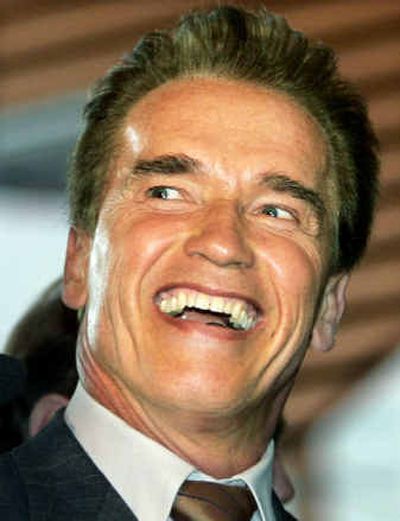Schwarzenegger still a political phenomenon

SACRAMENTO, Calif. – It’s been a year since Arnold Schwarzenegger became California’s 38th governor, and the Hollywood actor-turned-politician remains a phenomenon – theatrical, unbridled and radiating raw confidence.
He smokes giant cigars, calls state government “a mastodon frozen in time” and raises money like a mogul. He whips out old movie lines to make points. He cheerfully mocks opponents in the state Legislature as “girlie men” – and in this most politically correct of states, he gets away with it.
Swept into office on a wave of enthusiasm for his reform platform, Schwarzenegger promised to do things differently.
After capturing 48 percent of the vote in a field of 135 candidates to oust Democratic Gov. Gray Davis in a recall election, the Republican embarked on an aggressive agenda. He promised to improve California’s business climate, end partisan gridlock, break the hold of special interests and solve the state’s fiscal crisis.
Now he holds some of the highest approval ratings of any governor in California history, and a majority of voters say they’re optimistic again about California. “The Natural,” a serious political journal calls him.
“Fantaaastic,” says Schwarzenegger.
Yet the 57-year-old governor is a tangle of contradictions. He calls himself the “people’s governor,” but tilts fiercely toward big business. He promised to “sweep out” special interests, yet accepts more of their money than Davis did. And despite his popularity, 12 of the 16 candidates he pushed for legislative seats on Nov. 2 lost.
As Schwarzenegger marks his first 12 months in office Wednesday, even his staff call some of his campaign promises works in progress, including pledges to usher in a new era of openness at the statehouse.
His administration has been characterized by tight control over information – and even as he talks about open government, he frequently ducks reporters.
His backers say Schwarzenegger has had only a year to fulfill his promise to upend a Sacramento culture where “contributions go in, the favors go out.”
The governor has “established a trust with Californians … and he has been open,” said his spokeswoman, Margita Thompson. “Does he think more needs to be done? Absolutely, and he intends to do more next year.”
Two weeks ago, California voters passed Proposition 59, a constitutional amendment endorsed by Schwarzenegger that requires meetings of government bodies and writings of public officials and agencies to be open to public scrutiny. The governor’s personal appointment calendar will be open possibly as early as this week, he told reporters Friday on a trade mission to Japan. “I have no secrets,” Schwarzenegger said.
While certainly much has changed in California since Schwarzenegger took office, some argue that in key policy areas of state government – especially how tax money is spent – voters are getting a bad sequel.
“We have more debt than we did a year ago and several new forms of debt,” said Jean Ross, executive director of the California Budget Project, a liberal-leaning nonprofit group that evaluates the impact of state spending on low- and middle-income families. “We are just pushing off our problems into the future.”
Schwarzenegger makes no apologies for his first budget, anchored by a $15 billion loan that refinanced much of the state’s deficit. He says the borrowing buys the state time to find longer-term solutions. All three of the nation’s big rating agencies have upgraded California’s credit from record lows.
He’s heartened conservatives by repealing a $4 billion car tax and holding the line against new taxes. He’s encouraged liberals by proving himself friendly to the environment, stem cell research and rights of domestic partners.
But as he begins to craft his second budget, the nonpartisan legislative analyst’s office estimates that state income again will be about $8 billion short.
“Schwarzenegger has succeeded in some areas – restoring a sense of confidence is probably the biggest thing,” said Edmond Costantini, professor emeritus of political science at the University of California, Davis.
“But when it comes to the budget, it’s really a lot of smoke and mirrors. In some ways, when the history books are written, some will write that he really missed an opportunity to come to grips with our budget problems.”